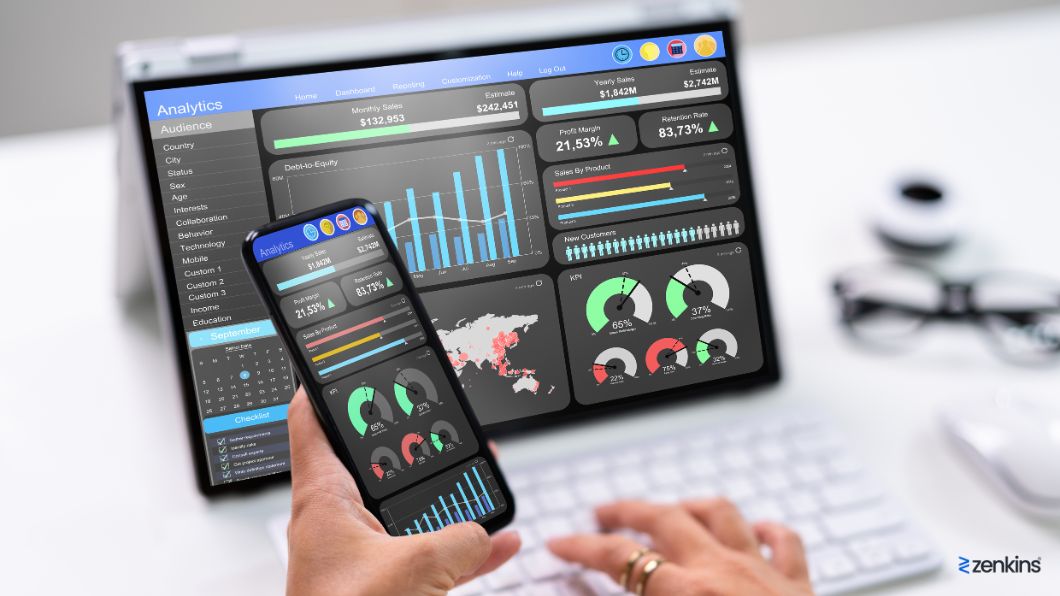Manufacturing at a Glance: Custom Real-Time Dashboards for Enhanced Production Visibility
Table of Contents
Introduction
In the fast-paced world of manufacturing, having real-time visibility into production processes is essential for optimizing efficiency, minimizing downtime, and ensuring quality output. Custom real-time dashboards offer manufacturing companies a comprehensive solution to monitor key performance indicators (KPIs), track production metrics, and make data-driven decisions. In this 3000-word blog, we will delve into the importance of real-time dashboards in manufacturing, explore the benefits of custom solutions, discuss real-world applications, and outline best practices for implementing custom real-time dashboards to enhance production visibility.
The Importance of Real-Time Dashboards in Manufacturing
Real-time dashboards serve as a centralized hub for monitoring and analyzing critical manufacturing data in real-time. They provide stakeholders with instant access to key insights, trends, and performance metrics, empowering them to make informed decisions and take timely actions to optimize production processes. In the highly competitive manufacturing landscape, where every minute counts, real-time dashboards play a crucial role in driving operational efficiency, agility, and responsiveness.
The Role of Custom Real-Time Dashboards in Manufacturing
Custom real-time dashboards address these challenges by providing a tailored solution that meets the specific needs and requirements of each manufacturing operation. Here’s how custom dashboards empower manufacturers with enhanced production visibility:
Centralized Data Integration
Custom dashboards consolidate data from disparate sources, including ERP systems, MES platforms, IoT sensors, and SCADA systems, into a single, centralized platform. By integrating data in real-time, manufacturers gain a holistic view of production operations, enabling comprehensive analysis and decision-making.
Customization and Flexibility
Unlike off-the-shelf solutions, custom dashboards are highly customizable and can be tailored to the unique needs and processes of each manufacturing operation. Users can define custom KPIs, metrics, and visualizations that align with their specific goals and objectives, providing greater flexibility and control.
Real-Time Monitoring and Alerts
Custom dashboards offer real-time monitoring capabilities, allowing users to track key performance indicators, production metrics, and equipment status in real-time. Automatic alerts and notifications notify users of potential issues or deviations, enabling proactive intervention and corrective actions.
Interactive Visualization and Analysis
Custom dashboards provide interactive visualizations and analysis tools that enable users to explore data, uncover insights, and identify trends in real-time. Interactive charts, graphs, and drill-down capabilities empower users to perform ad-hoc analysis, investigate root causes, and make data-driven decisions with confidence.
Role-Based Access Control
Custom dashboards support role-based access control, ensuring that users only have access to the data and functionality relevant to their role and responsibilities. Granular permissions and access controls help maintain data security and integrity while ensuring that users have access to the information they need to perform their jobs effectively.
Challenges with Traditional Reporting Methods
While the importance of real-time visibility is clear, traditional reporting methods in manufacturing often fall short in providing timely and actionable insights:
Data Silos
Manufacturing data is often scattered across disparate systems, including ERP, MES, SCADA, and manual spreadsheets. Consolidating and analyzing this data in real-time can be challenging due to data silos and compatibility issues.
Complexity
Traditional reporting tools may lack the flexibility and customization required to accommodate the unique needs and processes of each manufacturing operation. Pre-built dashboards and reports may not provide the granularity or specificity necessary for effective decision-making.
Limited Accessibility
Access to real-time data is often restricted to a select group of users or requires manual data extraction and manipulation. This limits the ability of frontline operators and supervisors to access critical information when needed, hindering agility and responsiveness.
Lack of Interactivity
Static reports and dashboards offer limited interactivity, making it difficult for users to drill down into data, explore trends, or perform ad-hoc analysis. Without the ability to interact with the data in real-time, users may miss valuable insights or overlook important trends.
Custom Software Solutions for Enhanced Employee Training in Manufacturing
Benefits of Custom Real-Time Dashboards
Tailored to Specific Needs
Custom real-time dashboards can be designed to address the unique requirements and objectives of manufacturing companies. By customizing dashboards to display relevant KPIs, metrics, and alerts, companies can focus on the data that matters most and derive actionable insights to drive performance improvements.
Enhanced Visibility and Transparency
Custom real-time dashboards provide stakeholders with a comprehensive view of production activities, equipment status, inventory levels, and other critical metrics in real-time. By consolidating data from disparate sources into a single, intuitive interface, dashboards enhance visibility and transparency across the manufacturing ecosystem, enabling stakeholders to identify issues, track progress, and make proactive decisions.
Improved Decision-Making
Custom real-time dashboards empower stakeholders with actionable insights and predictive analytics to support data-driven decision-making. By visualizing key trends, performance indicators, and production bottlenecks, dashboards enable stakeholders to identify opportunities for process optimization, resource allocation, and risk mitigation, leading to more informed and strategic decision-making.
Increased Operational Efficiency
By providing real-time visibility into production processes, custom dashboards help identify inefficiencies, minimize downtime, and optimize resource utilization. By monitoring equipment performance, production throughput, and quality metrics in real-time, companies can identify opportunities for improvement, implement corrective actions, and enhance overall operational efficiency.
Real-World Applications of Custom Real-Time Dashboards
Let’s explore some real-world applications of custom real-time dashboards in manufacturing:
Production Monitoring
Custom real-time dashboards can display key production metrics such as cycle time, downtime, throughput, and yield rates, enabling stakeholders to monitor production performance and identify areas for improvement. By visualizing real-time production data, companies can optimize production schedules, allocate resources effectively, and maintain high levels of productivity.
Quality Control
Custom real-time dashboards can track quality metrics such as defect rates, rework rates, and customer complaints, providing stakeholders with insights into product quality and process adherence. By monitoring quality metrics in real-time, companies can detect deviations from quality standards, implement corrective actions, and ensure that products meet or exceed customer expectations.
Inventory Management
Custom real-time dashboards can integrate data from inventory management systems to provide real-time visibility into inventory levels, stockouts, and replenishment status. By visualizing inventory data in real-time, companies can optimize inventory levels, prevent stockouts, and reduce carrying costs, ensuring that materials are available when needed to support production operations.
Equipment Maintenance
Custom real-time dashboards can monitor equipment health, uptime, and maintenance schedules, enabling stakeholders to proactively manage maintenance activities and minimize unplanned downtime. By visualizing equipment performance data in real-time, companies can identify potential issues, schedule preventive maintenance tasks, and optimize equipment utilization to maximize uptime and productivity.
Best Practices for Implementing Custom Real-Time Dashboards
To maximize the effectiveness of custom real-time dashboards in manufacturing, companies should follow these best practices:
Define Clear Objectives: Clearly define the objectives, requirements, and desired outcomes for the custom real-time dashboard to ensure alignment with business goals and priorities.
Identify Key Metrics: Identify the key performance indicators (KPIs), metrics, and data sources that are critical for monitoring and analyzing production processes.
Design User-Centric Interface: Design a user-centric interface that is intuitive, visually appealing, and easy to navigate, ensuring that stakeholders can quickly access and interpret the information they need.
Ensure Data Accuracy and Reliability: Ensure that data sources are accurate, reliable, and up-to-date to provide stakeholders with trustworthy insights and enable data-driven decision-making.
Provide Training and Support: Provide training and support to stakeholders to ensure that they understand how to use the custom real-time dashboard effectively and derive maximum value from the insights it provides.
Continuously Improve: Continuously monitor dashboard performance, gather feedback from users, and make iterative improvements to enhance usability, functionality, and relevance over time.
Case Study: Maximizing Production Visibility with Custom Dashboards
Consider a pharmaceutical manufacturing company seeking to enhance production visibility and optimize operational efficiency. By partnering with a custom software development company, the company implemented a custom real-time dashboard solution:
Data Integration: The custom dashboard integrated data from various sources, including ERP systems, MES platforms, and IoT sensors, into a centralized platform.
Customization: The dashboard was customized to display key performance indicators, production metrics, and equipment status relevant to each department and role within the organization.
Real-Time Monitoring: Users could monitor production processes, inventory levels, and resource utilization in real-time, enabling proactive decision-making and issue resolution.
Interactive Visualization: Interactive charts, graphs, and drill-down capabilities allowed users to explore data, analyze trends, and identify opportunities for optimization.
Role-Based Access Control: Granular permissions and access controls ensured that users only had access to the data and functionality relevant to their role, maintaining data security and integrity.
Conclusion
Custom real-time dashboards offer manufacturing companies a powerful tool for enhancing production visibility, optimizing performance, and driving operational excellence. By providing stakeholders with real-time access to key insights, metrics, and trends, custom dashboards enable data-driven decision-making, proactive problem-solving, and continuous improvement across the manufacturing ecosystem. By leveraging custom real-time dashboards, manufacturing companies can gain a competitive edge in today’s dynamic and fast-paced business environment.
Frequently Asked Questions
What are real-time dashboards, and how do they benefit manufacturing operations?
Real-time dashboards are data visualization tools that display key performance indicators (KPIs), metrics, and other relevant information in real-time. In manufacturing, real-time dashboards provide instant visibility into production processes, equipment status, and performance metrics. By consolidating data from various sources and presenting it in a visual format, real-time dashboards enable managers and operators to make informed decisions quickly, optimize production efficiency, and respond promptly to changing conditions.
How do custom real-time dashboards differ from off-the-shelf solutions?
Custom real-time dashboards are tailored to the specific needs and requirements of each manufacturing operation, whereas off-the-shelf solutions offer pre-built templates and limited customization options. Custom dashboards allow manufacturers to define custom KPIs, metrics, and visualizations that align with their unique goals and objectives. Additionally, custom dashboards can integrate with existing systems and data sources, providing a comprehensive view of production operations and enabling seamless workflow integration.
What types of data can be displayed on custom real-time dashboards?
Custom real-time dashboards can display a wide range of data relevant to manufacturing operations, including production metrics, equipment status, inventory levels, and quality indicators. Additionally, custom dashboards can incorporate data from IoT sensors, SCADA systems, MES platforms, and other sources to provide a holistic view of production processes. By presenting this data in a visual format, custom dashboards enable users to monitor performance, identify trends, and make data-driven decisions in real-time.
How do custom real-time dashboards enhance production visibility and decision-making?
Custom real-time dashboards enhance production visibility by providing a centralized platform for monitoring key metrics and performance indicators across the production line. By presenting data in a visual format, custom dashboards make it easy for users to identify trends, anomalies, and areas for improvement in real-time. This enhanced visibility enables managers and operators to make informed decisions quickly, optimize production processes, and respond proactively to changing conditions, ultimately improving overall efficiency and productivity.




